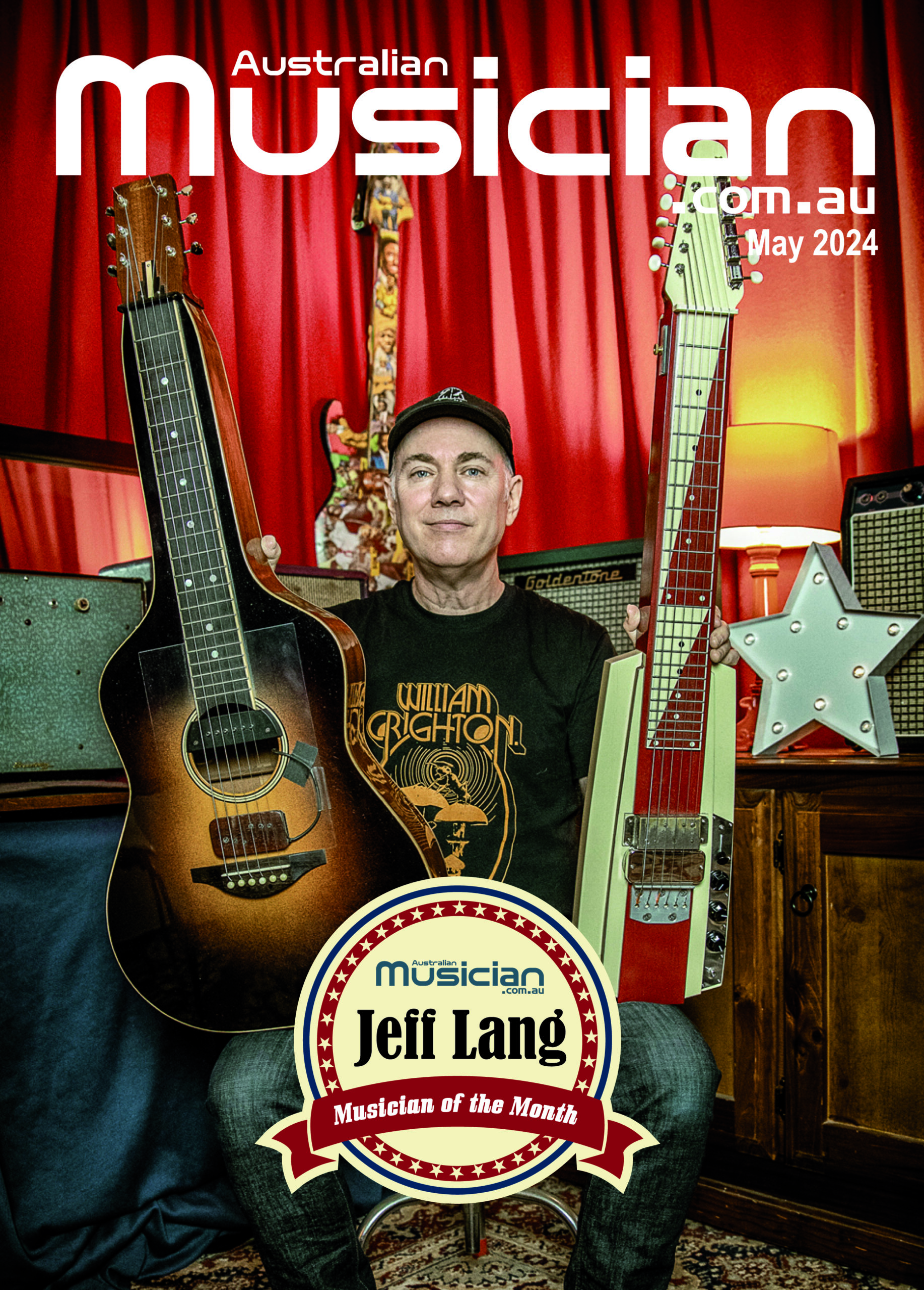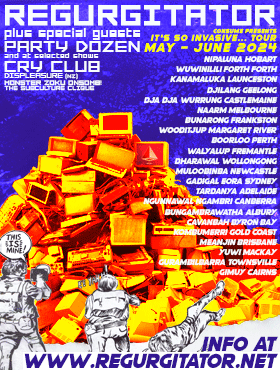 Jamie Coghill has been most publically visible as the drummer for Luxedo, Fez Perez and then The Devilrock Four, one of the fieriest, funniest drummers you’ll ever see, but his real passion is The Jimmy C, a cottage industry which springs from the tiny studio at Jamie’s place. As well as releasing many records, Jamie is responsible for the music for the cult American online TV shows The Adventures Of Superseven and The Sandra West Diaries. He has a deal with Foghorn Media in Sydney, and admirers worldwide, and is self-taught on all the instruments he introduces to records. All this while bringing up kids and working full time as a graphic artist. Michael Witheford investigates.
Jamie Coghill has been most publically visible as the drummer for Luxedo, Fez Perez and then The Devilrock Four, one of the fieriest, funniest drummers you’ll ever see, but his real passion is The Jimmy C, a cottage industry which springs from the tiny studio at Jamie’s place. As well as releasing many records, Jamie is responsible for the music for the cult American online TV shows The Adventures Of Superseven and The Sandra West Diaries. He has a deal with Foghorn Media in Sydney, and admirers worldwide, and is self-taught on all the instruments he introduces to records. All this while bringing up kids and working full time as a graphic artist. Michael Witheford investigates.
So all your records are pretty eclectic. Where do your songs come from?
First comes that all too elusive idea. Often it comes at a really inconvenient time, like in the shower during the morning rush of getting kids ready for school or walking to or from work … I’ll have to just sing the rough idea into my phone and hope it makes sense when I get back to it. If it’s a good idea it’ll stay in my head or pop back in and I’ll think of more ideas for it and eventually record a guitar and voice version with as many lyrics as I can think of and a 90% finished arrangement.
The idea itself is often just a few words and a vocal melody. Being a (mostly) non-musician it can be hard when I get a chance to pick up a guitar and try out the idea to actually find the chords that fit the melody in my head.
That’s the opposite of most of us who start with a chord sequence and add a melody.
Yeah! I think it stems from having so little time to spend actually doing music but constantly wanting to do music. It just comes out whenever it wants and that’s always when I’m doing something other than trying to write a song.
But once the basic arrangement has been strummed and mumbled into my phone I’ll usually wait until I have time to lay down some drums. This often happens during my half hour lunch break There’s a great benefit in working 5 mins from home! Sometimes I’ll edit the drums and cut and paste verse and chorus from the best take of that section – I do this a bit for soundtrack stuff because I’m often still unsure of the arrangement when I’m doing the drums, but most of the time I just make sure I play it properly so I don’t have to waste time editing.
How do you record the drums because they sound huge?
I use 6 mics of varying quality; Audix D4 on kick, SM57 on snare, cheap dynamics on toms and a pair of Tandy/Radio Shack Realistic PZMs sticky taped onto planks of wood leaning up behind/beside the kit as “overheads” : they’re actually underneath the cymbals going into my old Tascam 4-track cassette machine which acts as a mixer only, not actually going to tape anymore; toms via a tiny Behringer mixer to get the extra 2 mic inputs. I like the mic preamps in the Tascam and the EQ but I really only use it because it’s all I have and I honestly can’t afford to upgrade to something more hi tech and digital. Out of the Tascam it goes through a 1975 Realistic hi-fi amp then into the standard pink/blue 3.5mm headphone plugs in the back of my ancient PC running windows XP.
 Sounds like a sonic museum. What comes next?
Sounds like a sonic museum. What comes next?
I’ll load the drums into a Cool Edit Pro (v1.2) session and begin layering guitars, bass vocals and any other instruments I think will make it sound good. Being a drummer I’ll often break up guitar parts up onto separate tracks; Verses on one track, choruses on another. This allows for easy big gaps to be able to drop in and fix mistakes. Complicated parts can run up to 4 or 5 tracks just for one guitar part. I usually do 2 rhythm guitar tracks to balance it out and make up bass parts on the spot. Bass is probably my favourite. I love making up noodly bass lines. Sometimes the original idea has a bass line in mind but I can’t quite translate it until made a proper start on the song.
I only do 2-3 takes at any part. I think it’s due to my time being limited and my methods that I can get a “good enough for me” take pretty quickly. Guitar solos are a pain in the ass though! I don’t really consider myself a guitarist so I’ll have to do it over and over because I’m crap at lead guitar but vocals are often the first take – probably because it’s the vocal melody that I started with so it’s the most fully realised part of the song.

How do you record guitars?
I have a really nice guitar amp which I basically never touch. Probably because I’m worried I’ll make it sound shit by putting a mic in front of it. My usual bass/guitar rig is either my DOD Classic Tube pedal or my newer Aldi sans amp/pod type pedal that has a bunch of different amp combinations running straight into the 4-track. Most other overdubs (even singing) go through a PZM. Though I do have a cheap vocal condenser mic for when I want a warmer vocal tone. I use a Mosrite bass and my wife’s ‘60s Gibson SG Junior!
You have a bunch of other weird vintage stuff too.
Yeah, a symptom of getting old is you manage to acquire stuff … junk mostly. I consider myself very lucky to have a room in my house that’s just for me and my music. Many are hand-me-downs and stuff people didn’t know what to do with: vintage accordion, mandolin, op shop Lincoln Chordmaster, various percussion, Stylophone, Korg Monotron, various toy pianos etc… I can’t play them but I can get a sound out of them – if it makes a sound I can record it!
 Software?
Software?
You’ve heard of Pro Tools right? Yeah well I use Cool Edit Pro v1.2 from 1999. Before that I’d been recording albums on my Tascam 4-Track cassette machine actually going on to tape. I’d fill 4 tracks then transfer a stereo mix onto the computer in an even older stereo wave editor (Sound Forge), then record a stereo mix back onto 2 tracks of the 4-track and overdub onto the remaining 2 tracks then back to the computer and so on and so on until I had a finished song. Switching to digital multitrack was such a liberating experience even though I was still so many years behind everyone else’s technology.
I made my first proper album after this revelation: (Glamour & Fame 2009) and since then have been making constant changes and improvements to my techniques each time I record a song. It’s allowed me to really make the music I wanted to make yet still sounding vintage and retro due to the limitations of my setup (and my taste in music) – which is totally ok with me. I’d been happy sounding like the “Nuggets” classic garage bands I love but now I was able to aim higher and make music like the less garagey bands I worship: The Zombies, Pretty Things, XTC, Kate Bush, Emitt Rhodes, ELO, Idle Race, The Move … and more contemporary bands like Ween, Super Furry Animals, Jellyfish & Calexico.
I really enjoy pushing my no frills gear to create sounds beyond what they reasonably should. I even enjoy being limited to stereo drums only. I can’t get bogged down pouring over the snare drum in minute detail the way some people do because it’s all in there with the rest of the drum kit. It’s a waste of time anyway …
Do you have a favourite record of yours?
My favourite of my albums is always my most recent. The subtle changes in the way I record are always a small step up, always a slight improvement, which makes it harder to look back. I’m really proud of my previous albums though, especially Orbital Debris, which I think was a bit of a breakthrough for me. It certainly got noticed by the few people who had a chance to listen to it, but my latest album Un Homme Orchestre, which was released as 3 E.P.s, on iTunes has my most accomplished songwriting and recording to date. But I’ll say that about the next one too probably!
You can check out the full Jimmy C discography here.
also available on apple music, spotify etc for streaming.
YouTube vids page:
Born Without A Brain Video (new song, not on an album yet):
Christmas morning (recommended)
Pale Blue Dot: ( recommended)
Half Assed Life with the live band:


